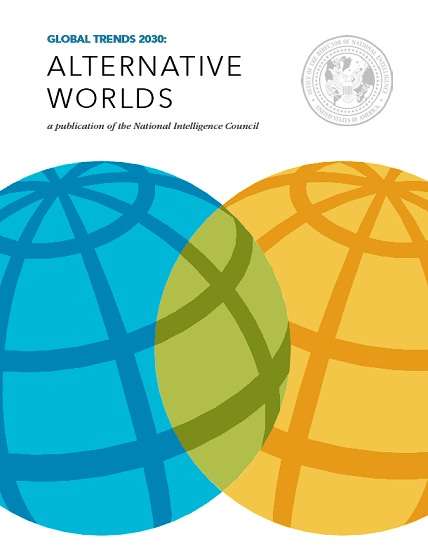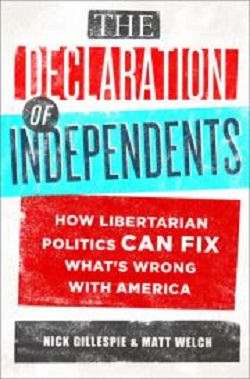Imagining the World in 2030: "Driven by new technologies, nonstate actors take the lead in confronting global challenges."
The National Intelligence Council presents possibilites for how the next 20 years might play out

The National Intelligence Council's Global Trends 2030 report made news earlier this week for its forecast of a precipitous decline in America's status as a sole superpower. From the report:
How the United States' international role evolves during the next 15-20 years—a big uncertainty—and whether the US will be able to work with new partners to reinvent the international system will be among the most important variables in the future shape of the global order. Although the United States' (and the West's) relative decline vis-a-vis the rising states is inevitable, its future role in the international system is much harder to project: the degree to which the US continues to dominate the international system could vary widely.
The US most likely will remain "first among equals" among the other great powers in 2030 because of its preeminence across a range of power dimensions and legacies of its leadership role. More important than just its economic weight, the United States' dominant role in international politics has derived from its preponderance across the board in both hard and soft power. Nevertheless, with the rapid rise of other countries, the "unipolar moment" is over and Pax Americana—the era of American ascendancy in international politics that began in 1945—is fast winding down.

The evolution of U.S. power is one of six "game changers" the NIC identifies will affect global politics over the next twenty years; a crisis-prone global economy (which won't return to pre-2008 growth levels for "at least" the next decade), governments' inability to change as fast as the world, the potential for conflict caused by power-shifts, regional instability and new technologies.
Those game changers are underpinned by the "megatrends" the NIC says will play out over the next decades: individual empowerment (see Declaration of Independents for more), diffusion of power, demographic patterns (the Western world is getting older while urbanization accelerates in the developing world), and increased global demand for food, water and energy (interconnected).
From these sets of trends and variables, the NIC posits four potential futures: a "best-case scenario" of increased cooperation between the U.S., China and Europe as economic and security interests increasingly align, a "worst case scenario" of conflict and fragmentation in a stalled global economy, a scenario where political, social and economic inequalities work against integration and stability, and a scenario of the "nonstate world," where:
nonstate actors—nongovernmental organizations (NGOs), multinational businesses, academic institutions, and wealthy individuals—as well as subnational units (megacities, for example), flourish and take the lead in confronting global challenges. An increasing global public opinion consensus among elites and many of the growing middle classes on major global challenges—poverty, the environment, anti-corruption, rule-of-law, and peace—form the base of their support. The nation-state does not disappear, but countries increasingly organize and orchestrate "hybrid" coalitions of state and nonstate actors which shift depending on the issue.
The NIC acknowledges the surveillance state:
The widespread use of new communications technologies will become a double-edged sword for governance. On the one hand, social networking will enable citizens to coalesce and challenge governments, as we have already seen in Middle East. On the other hand, such technologies will provide governments—both authoritarian and democratic—an unprecedented ability to monitor their citizens.
And of course, what prediction of the future would be complete without a word on the war on terror. It could, kinda, end:
The current Islamist phase of terrorism might end by 2030, but terrorism is unlikely to die completely. Many states might continue to use terrorist group out of a strong sense of insecurity, although the costs to a regime of directly supporting terrorists looks set to become even greater as international cooperation increases. With more widespread access to lethal and disruptive technologies, individuals who are experts in such niche areas as cyber systems might sell their services to the highest bidder, including terrorists who would focus less on causing mass casualties and more on creating widespread economic and financial disruptions
And a bonus, which of the following is more likely if governments insist on controlling everything? From the report:
Some of the world's future megacities will essentially be built from scratch, enabling a blank-slate approach to infrastructure design and implementation that could allow for the most effective possible deployment of new urban technologies—or create urban nightmares, if such new technologies are not deployed effectively.
The whole thing here.
